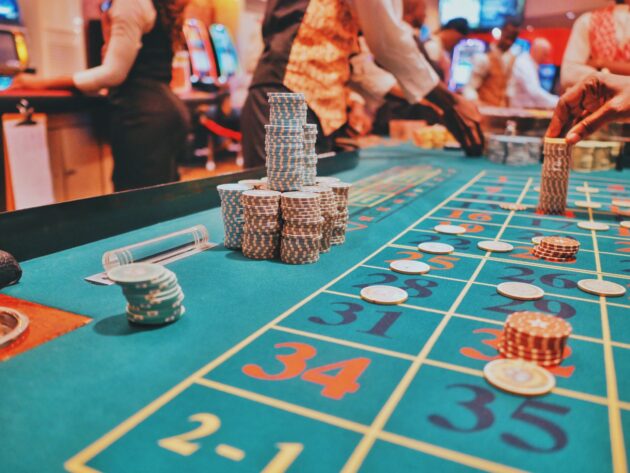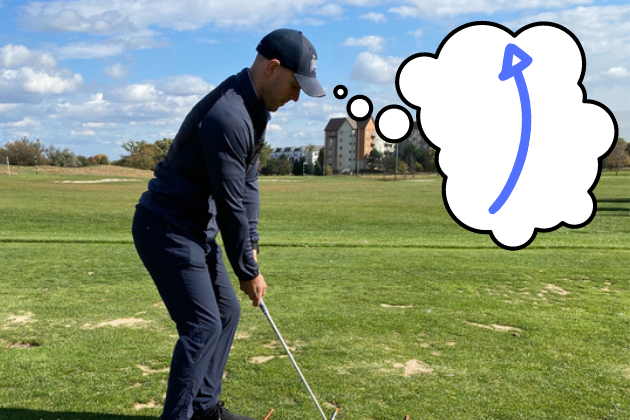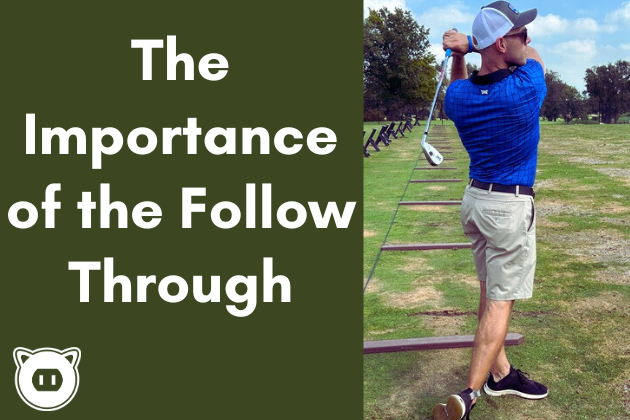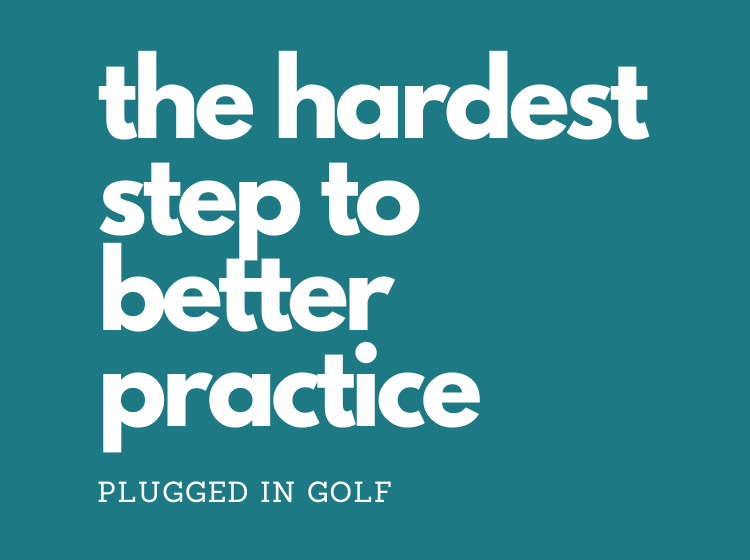A Paradox
This past spring, I remarked to Matt Meeker that I was nearly perfect on shots that I “called.” If, after a wayward drive, I said I was going to cut the ball around the tree and onto the green, you could take it to the bank.
After I said this, I started thinking, “If I’m so good at hard shots, why am I missing so many easy ones?” The answer makes up today’s lesson.
This Lesson Is For You If:
You want to improve your ball striking and your scores
Why Hard Shots Are Easier
I’ve come up with a list of five reasons why hard shots are easier than easy shots. If you can consistently apply these five ideas to your “regular” shots, your ball striking will improve. These same concepts can be applied to improve your short game, too.
Reason #1: Commitment
When you’re in the deep woods and there’s only one path to the green, your choice is clear. You know that the ball needs to fly at a specific trajectory, go through the gap in the trees, fade ten yards, and land on the green. You step into the shot with total commitment because you know there’s only one way to succeed.
In contrast, you have nearly infinite choices on your average par 3 tee shot. You could cut it, draw it, flight it high or low. You can hit more club or less. This often leads to taking the club back while thinking, “Is this the right club?” That indecision can be fatal.
Takeaway: Committing to your shot is critical, whether you have one choice or endless possibilities. Before you step into each shot, say to yourself enthusiastically that this is the right plan. Full commitment to a mediocre plan is better than half-hearted commitment to a great one.
Reason #2: Focus
That shot out of the trees is tough. It knows that it’s tough, you know it’s tough, and it knows that you know that it’s tough. The tree shot demands your full attention.
The stock 8I from a perfect lie knows that it’s the shot you hit thirty times during every range session. You can probably hit this shot decently with your mind on other things…so you often do.
Takeaway: Give every shot your undivided attention. We don’t want to psych ourselves out by focusing on the difficulty of any given swing, but we need to respect each shot enough to give it our best effort.
Reason #3: Stakes
When you call your shot, you’re putting pressure on yourself. You know that if you call for the big cut and miss, you’re going to hear about it. Even if you’re playing alone – or you have friends who don’t razz you – you feel the pressure of taking on a big, risky shot, and that adds to your focus.
Takeaway: If you’re keeping a real, honest scorecard, you need to recognize that every swing has stakes. Every shot is a chance to set up a birdie, save a stroke, or give away hard-earned progress. While we’re not trying to paralyze ourselves with pressure, we need to care enough to concentrate.
Reason #4: Fun
Every time that I call a shot, I have a smile on my face. I know that I’m taking on an added level of difficulty and risk by choice. And, because everyone knows I’m choosing a low percentage shot, I feel free. If I miss it, I’ll go hit it again. No big deal.
Is this the opposite of #3? Yes. Golf is a funny game. Humans are funny creatures.
Takeaway: Know yourself. If you need high stakes and pressure to perform, ignore this and focus on grinding out every shot. However, some players need to be loose. Most need to find a middle ground. If you find yourself wearing down your molars with stress, focus on the fun and smile.
Reason #5: Imagination
It’s virtually impossible to hit one of these wild recovery shots without seeing it in your mind’s eye first, and that is a massive difference maker. Before I take the club back, I’ve seen the ball launch low, curve right, and land on the green. All I have to do is make it happen again.
When I’m hitting that stock 8I, I rarely take the time to visualize. The rationale is that I’ve seen this film before, let’s just hit the shot. But that lack of imagination can lead to a lack of commitment and focus. Being unfocused can lead to laying the sod over the ball.
Takeaway: Make visualization a part of your pre-shot routine. This does not need to take long, just a second or two with your eyes closed to imagine the club striking the ball and creating the exact trajectory, shot shape, and result that you want.
He founded Plugged In Golf in 2013 with the goal of helping all golfers play better and enjoy the game more.
Matt lives in the northwest suburbs of Chicago with his wife and two daughters.
- Performance Golf Click Stick Training Aid Review - October 18, 2024
- Callaway Opus Platinum Wedge Review - October 17, 2024
- When to Take a Break from Golf - October 15, 2024




















10 Comments
Interesting article. I also think a key reason is that all your attention is on the shot, and no focus on your swing mechanics. I think this is captured in your article but I think it is a critical element!
Stephen,
That’s very interesting. I’d be curious to know if people think about mechanics more or less on difficult shots.
Best,
Matt
I was just thinking that on a normal shot I can get so focused on my swing thought that I paralyze myself a but when I have to hit a low hook out of trouble, I tend to visualize the shot and then naturally make it happen. Maybe I am the anomaly, but that seems to happen to me often!
Yes, all of the above Matt. You nailed it again. And I agree with Stephen, I do picture the shot I need to hit, the club that’s going to produce that path, and the swing that matches the club and the shot shape. And I also agree, those shots are fun. Those are the shots I get to show off my craft, my artistry.
I was taken by three 13 year old boys I played with. I was envious of their fluid swings, their flexible spines and their swing-out-of-their-shoes tee shots — a marvel to watch. However, what inspired me was how much fun they were having, they made it a true game, seeing who could hit closest to the pin, who’s tee shot went farthest and straightest, et cetera. And when they went into the woods, water or bunkers, they were smiling and laughing. They challenged each other to shape their ball around the tree and under the branches, or out of the greenside bunker with spin, or pick a fairway bunker shot clean, then who could hit a flyer out of the rough! They ran back and forth across the green or fairway to try the shots and moved on without any apparent emotional scarring after missing their shot. They played without fear or desperation, no cursing, throwing or slamming clubs, no sulking — just light hearted play — unlike many adults I play with regularly. In that round, I saw how seriously I had taken the game, how tight my body had become, and how hyper-focused, myopic, I had become around scoring low and making every shot count as if my life depended on it. I was thrilled that they enjoyed my game, and that they were wowed by my lowest scores, and even more psyched when they asked me to show them how to hit certain types of shots, which they would in turn see if they could hit. They reminded me that golf was fun, it’s supposed to be a challenge, and when you’re on the course, laugh whether you make them or fail miserably trying. Even their banter between shots or in between holes made me smile. I carry that day with me and when I feel my body get heavy, my mind get too intent, or the stakes feel high, I think about playing with those boys and immediately feel buoyant again. We could all learn a thing or two from youthful spirits, light hearts, and fluid swings.
Yes Matt, this game is fun — and the more fun we have, the more likely we can hit that shot, and if not, laugh and reload.
Great article Matt. I love the tough shots as they require all the right intensity. Routine shots can do the opposite as I tend to get lazy. “When” I purposely focus on where I want the shot to go, the game suddenly becomes fluid and when I don’t it is static and stiff. You hit upon the key “maintain focus on each shot – have a TW intensity- and you will see the routine even be spectacular!
Watching an invitational about 40 years ago I saw a pro from a neighboring course hit a shot from the trees through an opening and and hitting the green. What struck me then was the total focus on the shot as he hit it. And for 40 years I have had that feeling of focus and concentration when I’m off the fairway. But I realize from the lesson above that my game would be better if I used the same attention on all of my shots. I often find myself saying “I can’t talk and shoot” or “I can’t eat and shoot”. To shoot good golf nothing else can be in your head.
Jay’s story about the 13 y.o. boys was really great. And your 5 points, Matt, were well said and for me very valid. Thanks to you both.
Hello Matt. I live in Sweden and follow your work both testing and this type of advice. In this summer holliday something strange happen and i have havent find the reason for that until now. I started on hcp 9,6 and 5 weeks later i was on 4.5…how could this happend? The answer is a mix of things. First i was looking forward to play a lot of golf so i was happy and positive from the time i park my car at the club. I am a good fairway finder but dont hit as long from tee as my friends. But i dident care about this because i was doing the best thing in life. After reading this and some comments it was so clear why i manage to play this good. I was having fun and every shot i fokused on but dident get angry when i missed just went to the next shoot. This really tells me that be positive give every shoot a good thought and still be happy when you miss…ewery one miss and it is the next shoot that matters for your score…. I hope yo can understand this not so good english. Thank you for giveing me the explanation of my succes tihis holliday. BR Mats Nilsson
Mats,
Congratulations! That’s an amazing handicap drop!
-Matt
Thank you Matt and you do an amaizing jobb, i look and read every day.
Buy the way i am 61 years old and this summer i got my lowest hcp ever so i am proud of course. :)
BR Mats